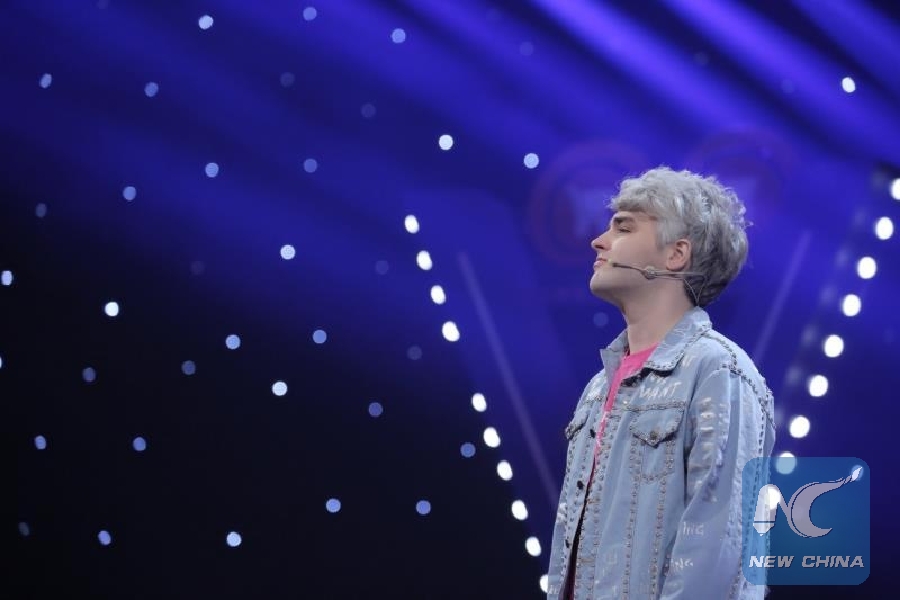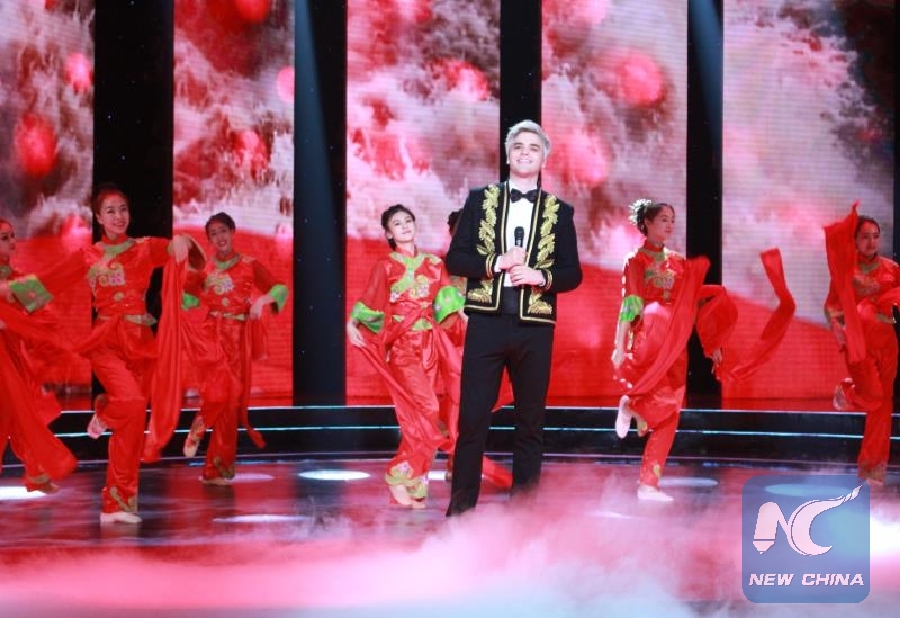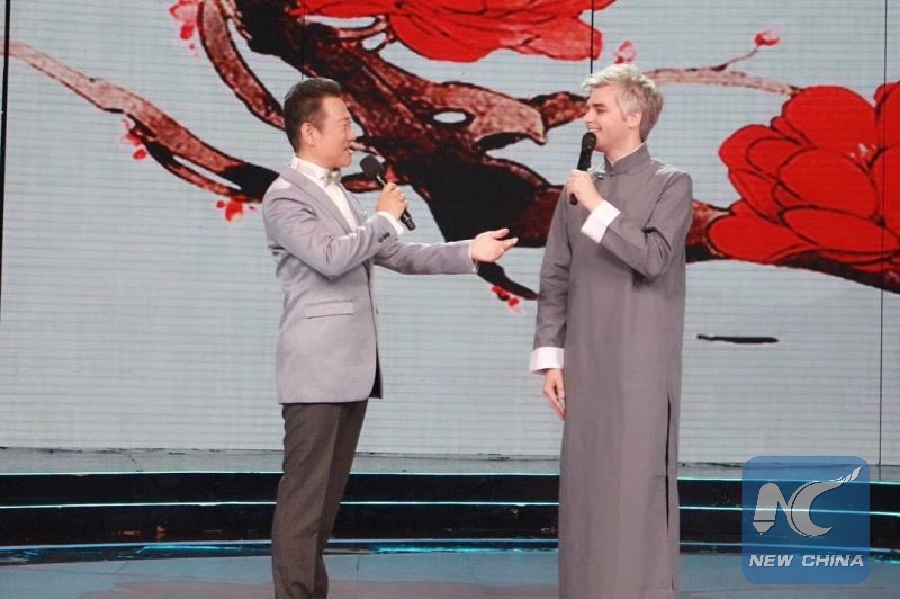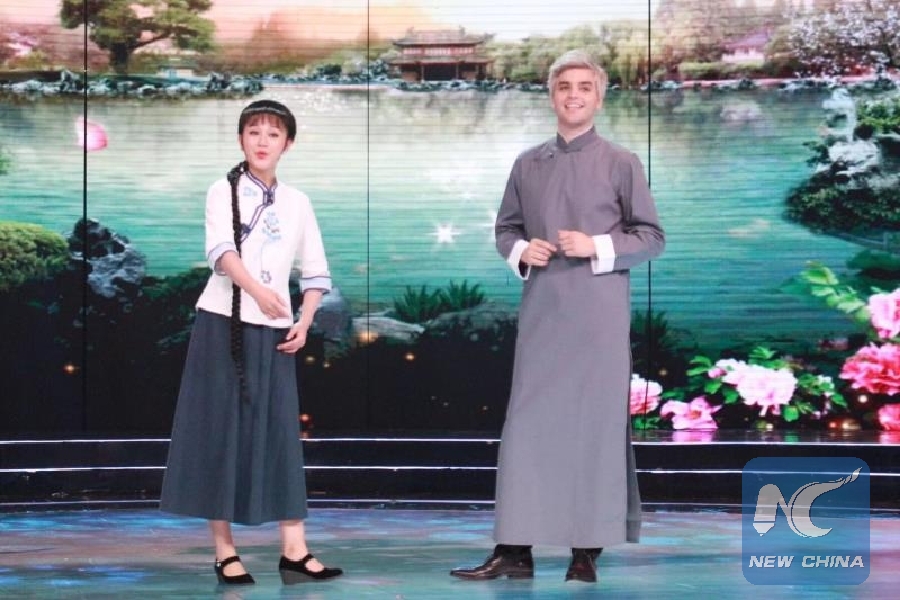
This photo, provided by Slater Rhea, shows he is giving performance on a game show taped in Spring 2018 in Hebei Province, north China.
by Tamara Treichel
BEIJING, Sept. 11 (Xinhua) -- Slater Rhea has become a musical phenomenon in China with his uncanny command of Chinese folk and pop songs and fluent Mandarin. The young American with silver hair and hazel eyes combines the Southern charm of his native Louisiana with the suavity of an experienced China hand while navigating Chinese society, to which his millions of fans here have responded enthusiastically.
Rhea's love of music goes back to his childhood. "I've loved singing and music my whole life, and my mom always encouraged me to 'become the next Elvis'-- she knew I had the ability to perform and the audacity to take to a grand stage," Rhea told Xinhua in a recent email interview after a whirlwind summer performing on Chinese TV.
"I sang solos in my children's choir way back when I was six and seven. But it wasn't until I started learning Chinese in college and searched for Chinese music online that I found Chinese songs and had the idea that I could really do this."

This photo, provided by Slater Rhea, shows Rhea at a performance of "Singing Loud For West China" in June 2018 for a show on CCTV. "Singing Loud For West China" is a song Rhea is known for singing.
Already in his younger years, the singer was attracted to various facets of Chinese culture and recognized the importance of learning Chinese as China was fast becoming a major global player. Rhea, an outstanding student, attended the University of Oklahoma as a National Merit Scholar, where he studied Chinese Language and Literature and Asian Studies.
He started out by performing at Chinese-related events at his university, and then eventually at events held by the Chinese Consulate in Houston. "Once I started singing at various events and getting lots of encouragement from the audience, I started to let myself believe, 'hey, I could really make a career out of this,'" he said.
Rather creatively, he used music as a method to study the Chinese language.
"It was actually my love of music in general that led me to seek out Chinese music as a study tool in learning the language. So I went online to find some Chinese songs, and I was just blown away by what I found. The tunes were just weirdly enchanting and the vocalizations were like I'd never heard before," he said.
"I remember thinking I couldn't make the sounds I heard being sung, and I think that was what intrigued me the most and spurred me to try to sing some of these songs over and over to myself -- in the shower sometimes -- until I found, in fact, I could do it."
Today Rhea makes time for his musical career while simultaneously working as an assistant professor of International Studies and English at the Beijing Foreign Studies University, China's top foreign languages university. Known to the Chinese as "Shuai De," Rhea is now recording an album of songs he has written himself and performs regularly on Chinese TV, where he enjoys a good working relationship with some top Chinese talents.
"I think Chinese people in general are extremely welcoming and accommodating to foreigners and that has definitely been the case when it comes to Chinese hosts and other talent I interact with all the time. Two hosts I work with pretty regularly are Negmat Rahman and Ren Luyu, both of whom are regular hosts of the CCTV Spring Festival Gala and they both treat me like a little brother."
 This photo, provided by Slater Rhea, shows Rhea together with Zhao Baole, a famous cross talk performer and CCTV host, on a CCTV show in Beijing in June 2018.
This photo, provided by Slater Rhea, shows Rhea together with Zhao Baole, a famous cross talk performer and CCTV host, on a CCTV show in Beijing in June 2018.
Rhea is a regular on Rahman's CCTV 3 show, Super Star Ding Dong, which he described as a "name that tune kind of show," and Ren's show on CCTV 15 Global Chinese Music. Referring to Ren, Rhea said, "He's the one who first called me a 'musical diplomat,' and that has become my calling card. Those guys are just like big brothers to me in the industry, and I really appreciate them."
Rhea said the greatest influences on his music are American singer Paul Simon, with whom he shares the same vocal range, as well as Chinese pop artists Han Hong, Li Jian, Yang Zongwei and Liu Huan, as well as Wang Hongwei's sweeping ballads such as "Singing Loud for West China."
"Of course I can't talk about my musical background without mentioning Jazz," Rhea said. "I'm from Louisiana, the birthplace of Jazz, and I love everything from Johnny Hartman and John Coltrane to Tony Bennett, so I do try to infuse my music with a Jazz sensibility."
Rhea said that whereas many young Chinese artists are interested in Western and American music and bringing elements of those into their act or imitating Western genres like hip-hop, he is interested in the opposite. In other words, sharing Chinese music and culture with the world is the singer's "Chinese dream." During past performances in the United States, Americans have responded positively to his rendition of Chinese songs.
"I always say I want to take up and share Chinese music and culture with the world. To me, distinctively Chinese genres and musical elements are really special and deserve to be celebrated, and I think that has been a secret to my success. I held several concerts in the States back in February and March, where I sang traditional Chinese songs and the audiences were mesmerized and touched," he said.

This photo, provided by Slater Rhea, shows Rhea on a CCTV show in June 2018 in Beijing together with a student of Huangmei Opera, Anhui's local opera.
Chinese audiences, too, went wild for his music. "The most rewarding thing for me is when I'm out and about, particularly when I travel outside of Beijing and I get recognized by average people who have seen me on TV. They come up to me and tell me how impressed and surprised they were by my singing. That's when I know I've made a difference and a connection that otherwise might never have been made between our two peoples," Rhea said.
In fact, Rhea sees himself as a cultural diplomat who uses music as a universal language. He had the honor of performing in front of dignitaries such as former U.S. President Bill Clinton, former U.S. Ambassador to China Max Baucus and former U.S. Secretary of State Madeleine Albright. Rhea has tremendous respect for Albright, whom he called "an incredibly learned and accomplished person."
Performing for Albright on the occasion of the 30th anniversary of the Johns Hopkins University-Nanjing University Center for Chinese and American Studies was a highlight for Rhea.
"I sang an Inner Mongolian folk song, half in Mandarin and half in the Mongolian language. And she was very, very warm and supportive. She told me she was touched by the performance and that what I was doing, immersing myself in and performing in the local culture, was important work reaching out to Chinese people in a way conventional diplomacy couldn't. I'll always remember her words of encouragement," Rhea said. Enditem
(Xinhua reporter Li Binian also contributed to the story.)

